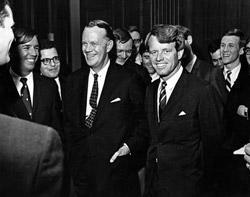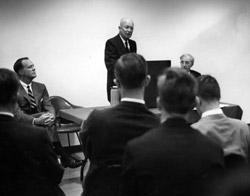

IFP Alumni
The International Fellows Program (IFP) was launched in 1960, at a time when the world was divided between East and West, capitalism and communism. Decades of global change – ideological, technological and cultural – have followed, but the Program’s goals have remained the same: to provide a forum for talented students in diverse fields of study to join together in examining a complex agenda, both conceptual and practical, of international problems.
In the decades since the International Fellows Program was established, fellows have gathered to discuss world affairs with some of the most prominent leaders of the 20th and early 21st centuries — leaders who have been instrumental in transforming the world and creating the society in which we live today.
Photos
President Dwight D. Eisenhower and Robert F. Kennedy met with early classes of international fellows.
-
Image

Senator Robert F. Kennedy -
Image

President Dwight D. Eisenhower
Prominent IFP Alumni
View more photos of early speakers for the Program
Dr. Jay Levy
(IF ’62, MD ’65), Professor of Medicine, University of California, San Francisco, Co-discoverer of the HIV/AIDS virus
“As a representative of the medical school, I greatly benefited from the insights gained from listening to my colleagues in fields such as politics, law, journalism, business, and education. I, in turn, was able to contribute information on aspects of science and medicine that affect political thought and international relations.”
Deepti Choubey
(IF ’04, MIA ’04), Fellow, The Foreign Policy Institute, The Paul H. Nitze School of Advanced International Studies, Johns Hopkins University
“I think what we really need to do if we’re serious about solving problems is start learning how to work at the intersection of issues and at the intersection of processes. With the diversity of students in the International Fellows Program, along with more time to cover more issues – I think that can be really powerful.”
Watch an interview »
Richard Smith
(IF ’69, Journalism ’70), Chairman, Newsweek
"My year as an international fellow was one of the most memorable periods of my life. At the time, America was deeply divided by U.S. involvement in Vietnam. I will never forget our trip to the nation's capital, where we were given the extraordinary opportunity to learn directly from the architects of US foreign policy, even challenge them, and become participants in a debate that shaped the future of our nation."
Watch an interview »
Judith Edstrom
(IF ’72, MIA ’72), International Development Consultant
“The program gave me unparalleled access to high-level policymakers, scholars and statesmen who shared their insights on key topics. By drawing together students from across the University, a much wider range of questions and vantage points characterized the dialogue than would have been possible had we been from only one program or discipline.”
Roger R. Baumann
(IF ’84, MIA ’85), Managing Director, J.P. Morgan Asset Management
“My admission into the International Fellows Program was a major factor in my choosing to attend SIPA. Fellows benefit from the differing perspectives offered by top students from each of Columbia’s professional schools, providing a unique, multidisciplinary approach to the study of world affairs. Through visits to Washington D.C., the United Nations and elsewhere, the IFP offers students an extraordinary opportunity to learn directly from distinguished policymakers past and present, while developing lifelong friendships with future leaders both in the United States and around the world.”
Watch an interview »
Julie Rasmussen
(IF ’90, MIA ’90),General Partner, Richmont Transportation Services, Hertz Master Franchise Russia
“I remember how great it was to be attending a seminar discussing issues that had direct relevance to the real-world work I was doing as part of my job helping businesses get into Russia. There is no question that the IFP was a highlight of my studies at SIPA.”
David Ottaway
(IF ’63), Senior Scholar, Woodrow Wilson Center
"What makes a great fellow, is someone who’s willing to listen to different points of view. If you listen carefully, you come away with a much better understanding of the different kind of values people bring to thinking about foreign policy issues. The conversation will be much enriched by the fact that you have such a wide variety of viewpoints around that table as you look at various issues in American foreign policy today."
Watch an interview »